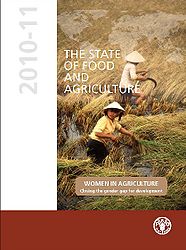- The SOFA Report 2011: “Women in agriculture: Closing the gender gap for development” (User:Wikigender, 15:02, 17 March 2011)
Agriculture is central to food security and global economic growth. In the last decade, governments and donors have made major commitments to revitalize the sector in developing regions. Yet, despite being more technologically sophisticated, commercially oriented and globally integrated, it is still underperforming. One of the key reasons is that the productivity of women in developing regions is stunted by a lack of access to resources and opportunities.
Women make sizable contributions to agriculture and other rural enterprises as farmers, workers and entrepreneurs. They make up 43 percent of the agricultural labour force of developing countries, from about 20 percent in the Americas to almost 50 percent in East and Southeast Asia and sub-Saharan Africa. While their roles vary across regions, one factor remains constant: everywhere, women face constraints that limit their capacity to contribute to agricultural production. They are also more likely to be in part-time, seasonal and/or low-paying jobs when engaged in wage employment. These factors not only affect their welfare and that of their families, but also impose a high cost on the economy and diminish the world’s capacity to achieve the first Millennium Development Goal (MDG1)--global food security.
The gender gap in access to assets is largely dictated by social norms and extends to all dimensions of agriculture. Customary practices often restrict women’s ability to own or operate land, the most important asset for households that depend on agriculture. Women hold between 10 and 20 percent of total land in developing countries, generally of a lesser quality than men’s [...The SOFA Report 2011: “Women in agriculture: Closing the gender gap for development”...]


